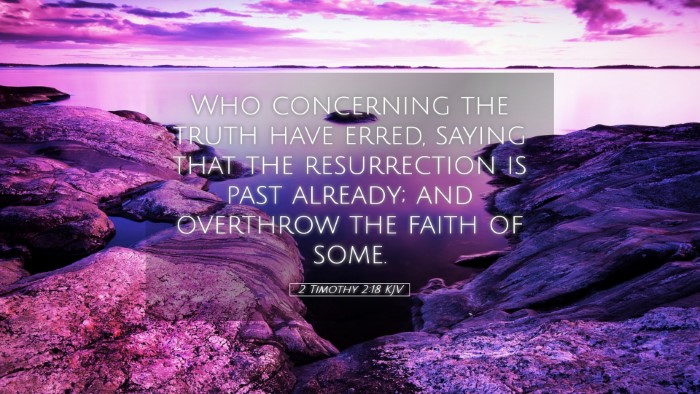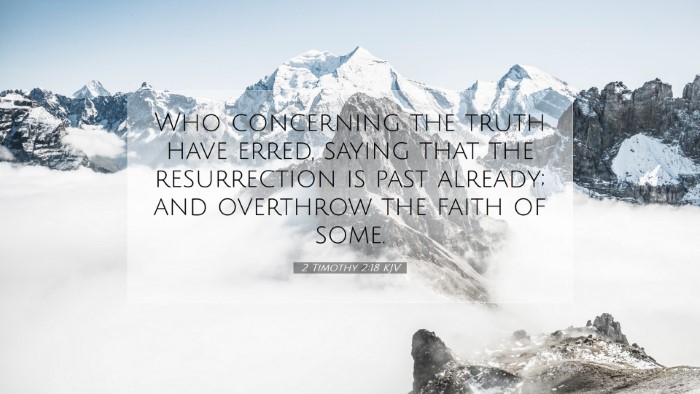Commentary on 2 Timothy 2:18
2 Timothy 2:18 states: "Who concerning the truth have erred, saying that the resurrection is past already; and overthrow the faith of some."
Contextual Overview
This verse occurs within a letter written by the Apostle Paul to his young disciple Timothy. At this time, Timothy faced numerous challenges, including false teachings that threatened the foundational beliefs of the church. Paul warns Timothy about certain individuals who had deviated from the truth of the Gospel, specifically regarding the doctrine of the resurrection.
Insights from Public Domain Commentaries
Matthew Henry's Commentary
Matthew Henry emphasizes that some individuals, notably Hymenaeus and Philetus, have erred concerning the resurrection. He notes that their erroneous teaching claimed that the resurrection had already occurred. This claim not only misrepresented the fundamental doctrine of Christian hope but also led to the spiritual downfall of some believers. Henry argues that such teachings undermine the very essence of Christian faith, asserting, "Those who deny the resurrection wrest the Scriptures and are leading others to perdition."
Albert Barnes' Notes on the Bible
Albert Barnes elucidates the nature of the error propagated by these individuals. He explains that the *resurrection* they refer to is not merely a future event but symbolic of a spiritual resurrection that they asserted had already taken place in the believers’ lives. Barnes observes that such viewpoints significantly diminish the anticipation of Christ’s return and ultimate resurrection of the dead. He states, "Such errors distract believers and lead them into a state of confusion regarding their ultimate hope."
Adam Clarke's Commentary
Adam Clarke offers a historical perspective, suggesting that the teaching denied the anticipated physical resurrection, reflecting the philosophical influences of Gnosticism that undermined bodily resurrection. He argues, "The danger lies in diluting the truth of Scripture with human reasoning, which is never a solid foundation for doctrine." Clarke stresses that this misguided interpretation fosters a sense of hopelessness among believers, rather than encouraging the expectation of the returning Messiah. He recommends that Christians maintain a fervent and unwavering adherence to the Scriptures to counter such misleading doctrines.
Theological Implications
The implications of this verse are profound, particularly regarding the resurrection. The resurrection is foundational to Christian doctrine; it signifies victory over sin and death, embodied in the resurrection of Christ. The falsehoods identified in this passage remind pastors and theologians of their responsibility to safeguard the teaching of the church.
Practical Applications for Ministry
-
Discernment in Teaching:
Leaders should cultivate the gift of discernment, ensuring they teach sound doctrine and remain vigilant against heretical teachings.
-
Importance of Resurrection Doctrine:
Regularly preach on the resurrection and its implications, reinforcing the hope it offers to believers. Special attention may be given to its role in spiritual victory and eternal life.
-
Encouragement in Faith:
Address doubts and confusion that may arise within the congregation. Provide pastoral guidance that points believers back to the truth of Scripture.
-
Engagement with Culture:
Understand the cultural philosophies that may influence church members' beliefs, addressing them with Scriptural truth as the foundation for all faith practices.
Conclusion
2 Timothy 2:18 serves as a stark reminder of the importance of sound doctrine in the life of the church. The admonitions from commentators highlight the need for pastoral vigilance, theological integrity, and the necessity of engaging the congregation with the truth of the Gospel. As Timothy faced challenges within his ministry, so do modern-day leaders face similar battles against false teachings. This verse and its surrounding context compel believers to uphold the hope found in the resurrection and to remain steadfast in their faith.


